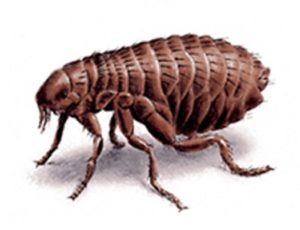The Problem With Fleas
The world is host to over 2,000 species of flea, and they’re a problem almost everywhere. Most common is Ctenocephalides felis, the “cat flea.” Despite its name, the cat flea affects both dogs and cats,1 as well as their owners, and wild animals such as raccoons and skunks.
When a flea jumps onto your pet, it will start feeding within 5 minutes and may suck blood for up to 2 1/2 hours. Female fleas are the most voracious, consuming up to 15 times their own body weight in blood.2 And a single flea can live on your dog or cat for almost 2 months!
Experts in multiplication
Flea infestations can rapidly get out of control. That’s because fleas lay eggs in such large numbers. At a rate of 40 to 50 per day for around 50 days, a single female flea can produce 2,000 eggs in her lifetime. Flea larvae burrow deep into fabrics, bedding and carpeting, so thorough, regular vacuuming and cleaning of your pet’s bedding (in very hot water) is recommended.1,2
Huge numbers of newly developed adult fleas can then remain dormant inside pupae or cocoons in your home for weeks to months. Only when conditions are right—a combination of heat, carbon dioxide and movement—will they emerge from these cocoons as young and hungry adult fleas, which will infest your pet.1,2
A threat that’s more than skin-deep
The most common external parasite found on pets, fleas can be a major problem for dogs, cats and the whole family. Simple itching caused by fleas can be irritating enough for a dog or cat. But fleas can cause more serious health problems too. Fleas are also responsible for transmitting the dog tapeworm (Dipylidium caninum) to dogs, cats and even humans. In addition, fleas can spread bacterial diseases, too.1,2
Some pets develop severe allergies to flea bites (called flea allergy dermatitis) and develop signs, such as itching, that may last long after the fleas have gone.1,2
While outdoor pets are more susceptible, your dog or cat may be exposed to these blood-sucking parasites anywhere: in your own backyard, on walks or even in your own home. When it comes to fleas, the faster you get rid of them, the better!

